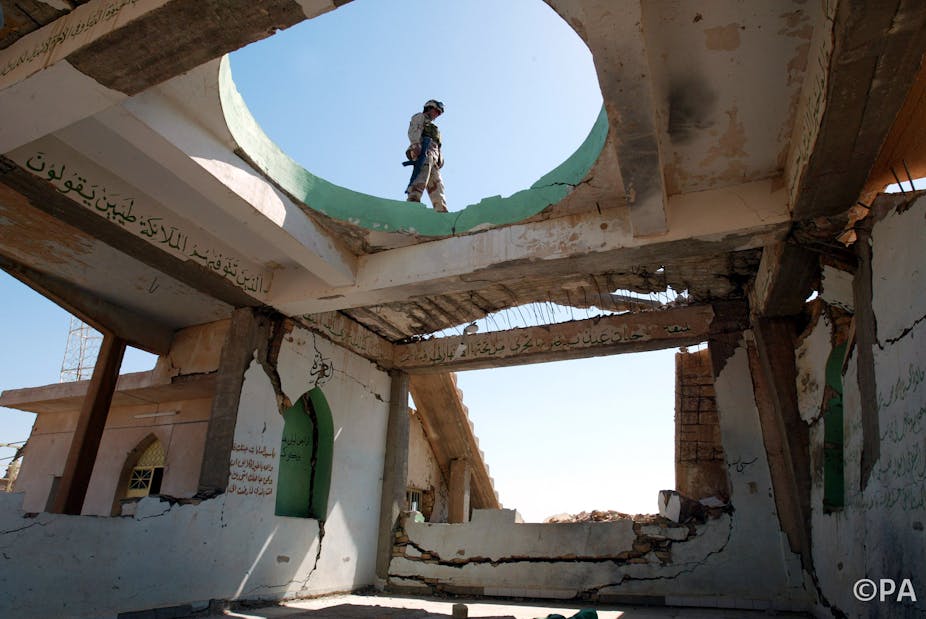We study the past to understand the present and to help shape the future. A society without a memory is a dysfunctional society. And much of a society’s memory is encapsulated within its cultural property – the physical remains of the past – its books, archives, art, historic buildings and landscapes, and its archaeological sites. Lose that cultural property and you are very close to losing collective memory.
George Clooney stars in and directed The Monuments Men. Critical consensus agrees that it is not a very good film, but it does raise a very important and contemporary topic – the protection of cultural property during conflict.
And it did indeed prompt much debate, most notably around the Elgin Marbles. The ethics and details of their original removal from the Parthenon has been much discussed, as well as the present day question of whether to return them or not. And antiquities trafficking is something that continues – but what has not been considered is the UK government’s continuing failure to address cultural damage today. Not only this, we are arguably the last major military power that has not done so.
World War II caused massive and devastating damage to Europe’s cultural legacy despite the efforts of the so-called Monuments Men. In reaction to this loss, the international community came together and produced the 1954 Hague Convention on the Protection of Cultural Property in the Event of Armed Conflict. With its second protocol added in 1999, it remains the primary relevant international legislation protecting cultural property during conflict.
Covering the full spectrum of heritage – architecture, archaeology, libraries, archives, art – the convention is a brave statement, implicitly acknowledging that there will be war in the future, but that such conflict need not unnecessarily destroy the legacy of the past.
Despite this, for the next 50-odd years, conflicts around the world were fought with little, if any, regard for the protection of cultural property. But the world’s attention was re-focused on the issue in 2003 following the looting of museums, galleries, libraries, archives, and archaeological sites across Iraq. This looting was facilitated by the USA and UK-led invasion and occupation.
In the build up to the invasion, cultural experts had tried to impress on their politicians and armed forces the importance, and vulnerability, of the cultural heritage in Iraq. The pleas fell on deaf ears and no troops were deployed to provide security for cultural buildings or their contents. Equally, no arrangements were made to protect archaeological sites – usually easily done by the payment of relatively small sums to local communities. Perhaps this was not surprising, as neither the USA nor the UK had ratified the 1954 Hague Convention.
Rocked by the bad publicity they received over the looting in Iraq, the military have slowly accepted the argument that the protection of cultural property is not only important, but that it can help make a military operation more successful. Put simply, the military may not win more friends but they could make fewer enemies if they prevent the destruction and looting of cultural property.
American politicians also reacted, and in 2009 the USA ratified the 1954 Convention. This leaves the UK as now the most significant military power – and the only one with extensive military involvements abroad – not to have ratified. Over the past decade successive UK governments have claimed that ratification is “a priority” and that the convention will be ratified as “soon as parliamentary time allows”.
During conflict, cultural property is threatened by four things: specific targeting, collateral destruction, military insensitivities, and looting. There is little that can be done during conflict about the first of these – but culprits should be left in no doubt that following a conflict they will be subject to the full force of international law that prohibits such action.
But much can be done about the other threats. Cultural experts should interact with the military continuously: in the long term, immediately before deployment, during conflict and post conflict. The UK Ministry of Defence acknowledges the importance of this structured liaison, and discussions are underway to develop the relationship. Lists of cultural property to be protected if at all possible have been delivered to the MoD and NATO for Libya, Mali, and Syria.

The success of such lists can be seen in the case of six mobile radar units that were placed next to a Roman fort in Libya by forces loyal to President Gaddafi. They were destroyed without damage to the fort. As a result of this action, NATO instigated an internal review which concluded that the organisation should develop its own Cultural Property Protection doctrine. While this has stalled, the acknowledgement of the issue is a massive step forward.
This year it is the 100th anniversary of the start of World War I, the 60th of the 1954 convention and the 15th of the 1999 second protocol. We had hoped that these three highly relevant anniversaries would provide the stimulus for the UK government to deliver on its commitment to ratify the convention.
Ratification is the responsibility of the Department for Culture, Media and Sport, commands cross-party support and is supported by the MoD, FCO, and DFID. Ratification would signal to the international community that the UK’s Armed Forces treat cultural property with the highest respect. Needless to say, ratification has the unreserved backing of the heritage and cultural sector.
Unfortunately, on 21 January we received a letter from MP Ed Vaizey, the Minister for Culture, Communications and Creative Industries, stating that:
It will now unfortunately not be possible to take forward a government-initiated measure to ratify the Hague Convention in the remaining time available to this Parliament.
For how long will our political masters obstruct us from joining the seemingly obvious international consensus? All other major military powers publicly and legally find destruction of cultural property during conflict unpalatable and indefensible. Why doesn’t the UK?

